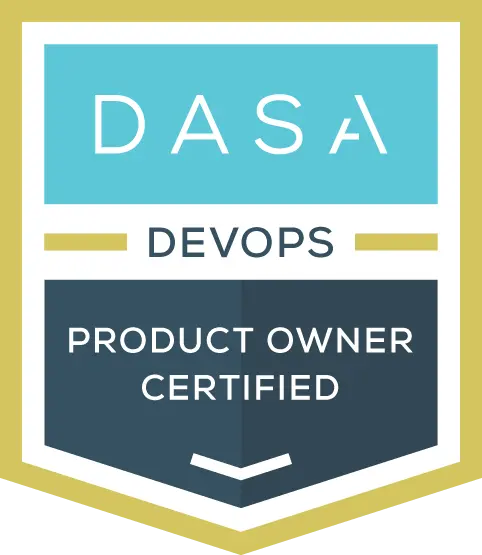As organizations increasingly rely on digital technologies to drive innovation and stay competitive, the role of a DevOps Product Owner has become ever more important. A DevOps Product Owner is responsible for maximizing the value users get from a product or service in a way that aligns with the business goals and values of an organization.
In this article, we will explore the DevOps Product Owner covering the role itself, the responsibilities it entails, and the necessary skills. Additionally, we will offer recommendations for organizations looking to implement this role.
The DevOps Product Owner’s role in the digital transformation
Digital transformation is fundamentally changing the way organizations operate and deliver value to their customers. In this new and ever-changing environment, it is critical for organizations to be able to react and deliver high-quality software quickly and reliably. This is where the DevOps Product Owner comes in.
It is the DevOps Product Owner’s responsibility to maximize the value users get from the product. He or she has to have a deep knowledge of the users’ needs and pain points in order to understand what product ideas truly provide value to them. This ensures long-term product success.
In practice, the DevOps Product Owner uses that deep understanding to define and prioritize the features and capabilities of a product or service. In doing so, this role helps ensure that the development team is working on the most valuable and impactful items first. This enables organizations to effectively deliver value to their customers at a high pace.
In addition, by working closely with the development team and other stakeholders, a DevOps Product Owner helps ensure that the product or service is delivered while taking the organization’s goals into account. The DevOps Product Owber also plays a key role in defining and communicating the product vision, strategy, and roadmap to the rest of the team, as well as gathering feedback from users and customers to inform future development.
Overall, the DevOps Product Owner plays a vital role in helping organizations achieve their business goals and deliver value to their customers in the digital age.
Responsibilities
A DevOps Product Owner plays a primary role in ensuring the efficient and effective delivery of a product or service. Some of the key responsibilities include:
- Understanding users and customers: A DevOps Product Owner is always looking for ways to increase the value the product or service brings for (internal or external) users. This is the most important responsibility, although in practice many Product Owners spend the vast majority of their time on other tasks. Maximizing the value of the product is the key to sustained success. This is only possible by gaining a deep understanding of the needs and pains of users and customers. The DevOps Product Owner is in frequent contact with those to gather feedback, watch them use the product, and test new ideas. The knowledge gained here is the basis for future developments.
- Defining the product: As established, the DevOps Product Owner works closely with developers, operations staff, and other stakeholders to understand the needs of the users and the goals of the organization. They then use this information to define and prioritize the features and capabilities of the product, ensuring that the development team is working on the most valuable and impactful items first, all the while making sure business objectives are met. In this, the DevOps Product Owner is the key decision maker in all questions related to the product.
- Managing internal stakeholders: A DevOps Product Owner aims to maximize the value for users. However, the goals and wishes of other internal stakeholders – marketing, sales, and executive leaders come to mind – and overall business goals need to be taken into account as well. It’s the DevOps Product Owner’s responsibility to frequently communicate with these internal stakeholders and ensure that their needs are met as well (or to at least make sure they are informed that their needs will not be met).
- Owning the product vision, strategy, and roadmap: A DevOps Product Owner is responsible for creating and communicating the product vision, strategy, and roadmap to the rest of the team and the entire organization. This includes sharing the long-term goals and objectives of the product, as well as the short-term priorities and deliverables.
- Gathering feedback from users and customers: A DevOps Product Owner is always looking for ways to improve the product or service. They gather feedback from users and customers to understand their needs and preferences and use this information to inform future development.
Necessary skills
To be successful in the role of a DevOps Product Owner, it is important to have a strong understanding of DevOps principles and practices. As outlined in the DevOps Competency Framework, this includes experience with agile methodologies, continuous integration and delivery, and the use of automation and other tools to streamline the development process.
In addition to technical expertise, a DevOps Product Owner should have excellent communication and collaboration skills. They should be able to communicate the product vision, strategy, and roadmap to the rest of the team, as well as gather feedback from users and customers. They should also be able to work effectively with developers, operations staff, and other stakeholders to ensure that the product is delivered efficiently and on time.
Finally, since the DevOps Product Owner is the key decision maker in all questions related to the product, he or she needs to be able to make those decisions swiftly and own the consequences. It’s crucial for the Product Owner to be willing and also capable of handling this significant responsibility (and the organization has to be willing to give it).
Final thoughts
In conclusion, the role of a DevOps Product Owner is critical to the success of any organization that relies on digital technologies to drive innovation and stay competitive. By gaining a deep understanding of users and customers as well as through managing internal stakeholders, the DevOps Product Owner is able to define the product, its vision, strategy, and roadmap, in such a way that the team can efficiently and effectively deliver high-quality software and services.
For organizations looking to implement a DevOps Product Owner role, we recommend partnering with a reputable consulting firm or investing in training and development for existing team members. By doing so, you can ensure that your organization has the expertise and resources it needs to succeed in today’s fast-paced, digital world.
In the digital age, the ability to deliver value quickly and reliably is crucial for organizations of all sizes. By embracing the DevOps Product Owner role, organisations can better align their technology efforts with their business goals, and deliver value to their customers more efficiently and effectively. So, it is a highly recommended role for any organization that wants to thrive in the digital world.


DASA DevOps Product Owner
Help realise maximum business value, engage with stakeholders, and deal with future requirements as well as operational challenges.

